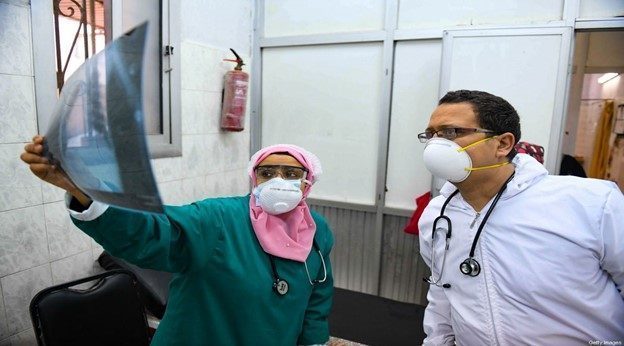
The “low wages” aspect may be the main reason behind doctors’ departure and migration in pursuit of better jobs abroad or even in private sector hospitals that may pay them higher wages.
Other significant causes for Egyptian doctors’ migration may be the continuous attacks and assaults targeting doctors in most Egyptian hospitals, and the poor opportunities for postgraduate studies and their high costs compared to the income of doctors.
Due to the government’s negligence and reluctance to solve their problems, young doctors continue to resign from government work and flee abroad in search of a better life.
However, the poor citizens remain the only victim of such situation.
“When a hospital in Britain offered Mohamed a new job in 2020, he didn’t have to think twice: The proposed salary was 40 times higher than what he was making at home,” reads a report by The Washington Post, adding, “Like other young doctors in Egypt, 34-year-old Mohamed had spent years in school and specialized training, only to be placed in a government hospital where he earned around $300 a month — barely enough to scrape by.”
The Washington Post’s report, written by Heba Mahfouz, quoted ‘Mohamed’, who spoke on the condition that he be identified only by his first name, fearing government reprisals for criticizing the medical system, stating that:
By moving to the U.K, he joined more than 11,500 doctors who left Egypt’s public health sector between 2019 and 2022, according to the Egyptian Medical Syndicate, many of them seeking better prospects abroad. Last year, more than 4,300 government-employed Egyptian doctors submitted their resignations, an average of 13.5 per working day.
The rapid exodus is fueling a shortage of qualified doctors in the country. The World Health Organization puts Egypt’s doctor-to-population ratio at 7.09 for every 10,000 people, well below its minimum recommendation of 10. The figure is 35 in the United States and double that in Sweden. But Egypt also lags behind some poorer nations, like Algeria (17) and Bolivia (10).
Mohamed said practicing medicine in Egypt felt like “hitting my head against a wall that never breaks.”
“I needed a place where I would wake up daily and care about nothing but supplying great medical care to my patients, and at the end of the month get paid enough to sustain a decent living,” he said. “I needed to leave.”
In Egypt, all medical graduates are mandated to work in the government sector for at least three, but up to five, years until they become specialists and can leave for better-paying work in private facilities.
During that time, they are paid 2,000 to 4,000 Egyptian pounds per month, a sum that has significantly decreased in value amid soaring prices and a recent currency devaluation. During the pandemic in March 2020, Egyptian President Abdel Fatah El-Sisi ordered a 75 percent increase in monthly pay, but the raises have not kept pace with the economic crisis.
A year ago, the exchange rate was around 15 pounds to the dollar. Now it has surpassed 30, leaving young doctors scrambling for side jobs in the private sector.
“How do they expect a person to survive [on that salary]? That is barely my transportation and breakfast costs for a month,” said Ekram El Azzazy, 28, a doctor in Cairo who works three jobs to make ends meet.
She sleeps in hospital hallways. “Working seven days a week just to survive is really draining,” she lamented. Sometimes, she said, she has been so disoriented that she didn’t realize a patient had checked in or “why the patient’s family was screaming at me.”
The Egyptian Medical Syndicate has blamed the exodus on low wages, as well as a poor work environment, including understaffed and under-resourced medical facilities.
Health Ministry spokesman Hossam Abdel-Ghaffar told The Post that Egypt has 5,426 primary-care units throughout the country, but only around half of them are “well-equipped,” with basic services such as radiology and a lab.
“For a time before, there was not enough care or attention paid to the primary-care units,” he said, adding that the ministry plans to renovate all such units by the end of next year.
Young doctors should be willing to make sacrifices, Abdel-Ghaffar said, because “the state bears 99.9 percent of the costs of their medical school fees.”
But efforts to make jobs in the industry more sustainable are not coming fast enough. And the shortage of medical staff in wealthier countries has made it simpler than ever for doctors in Egypt — and across the developing world — to find positions in Europe, the Persian Gulf region and the United States.
“It is more than easy for doctors in Egypt to leave,” said Ahmad Diaa, 34, an internal medicine resident in a Chicago hospital. “This is a problem that the government is not paying attention to.”
It took Diaa just two weeks of job hunting to land six offers outside Egypt.
In 2017, he accepted a position as a general practitioner in a primary care unit in Saudi Arabia. After just one year there, he had saved $20,000, which allowed him to travel to the United States to obtain his medical license.
In Saudi Arabia, Diaa said, his superiors understood that he had little experience and eased him into the job with basic tasks such as referring cases to hospitals and prescribing medications for clear symptoms.
The year before, fresh out of school in Egypt, he worked in a facility in the northern city of Monofeya that was in “depleted condition,” he said, where he was expected to shoulder much of the responsibility.
“It was a horrible experience. Without proper prior medical training, you are supposed to be responsible for a primary-care unit,” he said. “We had no ultrasound device, no X-ray, no lab.”
Late last year, Egypt’s Health Ministry opened several night clinics where doctors can work to earn additional income.
But the government is aware, Abdel-Ghaffar said, that it is “racing against time” to slow the accelerating brain drain and keep young doctors in Egypt.
“I am willing to work at multiple places, one to learn and the other to barely make any money, but this all has to sustain a living,” El Azzazy said. “I need to eat.”
She tries to remind herself of all the reasons she loves Egypt: The late walks with friends, hearing her native language in the streets. It’s what made her stay even as “everyone else is leaving.”
She was once sure she would never join them. “But I am now considering it,” she said.



